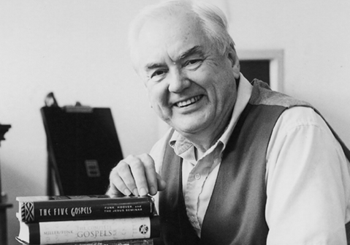Bible Belter
Da Funk: Jesus Seminar scholar Robert Funk is shaking up religious convention.
The Gospel according to Robert Funk
By Patrick Sullivan
ONCE UPON A TIME, Robert Funk was a teenage evangelist preaching to packed revival meetings. "I did that when I was starting out, sort of being a hotshot. I knew how to make people laugh, make them cry," Funk recalls with a self-deprecating chuckle, voice tinged with regret. A lot has changed since those evangelical days.
Now, as he sits in his busy Santa Rosa offices, the bespectacled, white-haired Funk is preaching a new gospel ... literally. The architect of a collaborative scholarly effort called the Jesus Seminar, Funk is the focus of a massive firestorm of controversy over the group's radical reinterpretation of the heart of the New Testament.
Essentially, the Jesus Seminar places Jesus Christ under the scholarly microscope. The deeds and words of Jesus as portrayed in the gospels are collected and evaluated by experts from various fields in an effort to establish their historical authenticity. The results then have been published in the seminar's 1995 bestseller The Five Gospels and in the newly released The Acts of Jesus (HarperSan Francisco; $35).
The shock waves generated by the final tallies have yet to quiet down. "We found that only 16 percent of the events we evaluated from the gospels were likely to be authentic," says Funk, a distinguished biblical scholar.
Indeed, the portrait of Jesus that emerges from the two books is deeply at odds with Christian orthodoxy. Forget the miracles: Funk dismisses anything like the idea of Jesus walking on water or raising the dead. Even the cozy stable in Bethlehem is out; it seems Jesus was actually born in Nazareth. More seriously, the historical Jesus is portrayed by the Jesus Seminar as a charismatic iconoclast who attacked contemporary religious institutions and social mores with revolutionary zeal and biting humor.
Of course, scholarly challenges to religious doctrine are nothing new. Riven by uncertainty, fraying into fundamentalism, Christianity might seem to some to be an easy target. But Funk argues that the Jesus Seminar's findings constitute an important new crisis for the faith.
"The rediscovery of who Jesus really was has powerful implications for the Christian tradition, for the institutions that grew out of this figure," Funk says. "If we allow him to have something to say about those institutions, they're going to suffer a new and sweeping reformation."
THIS CONTROVERSIAL effort had its beginnings here in California in 1985, when Funk, troubled by religious doubts and hungry for truth, put out a call for scholars to come together to discuss biblical issues. He was pleasantly surprised to have 35 people show up to the first meeting.
"Nobody had ever inventoried all the words attributed to Jesus or collected all the stories told about him, so I wanted to do that first," Funk says. "I guess I have the Tom Sawyer approach to painting fences. You have a big fence to paint, you get a bunch of people to help you paint it."
The big question tackled by the Jesus Seminar concerned the origin of what we now accept as the standard accounts of the life of Jesus. The first written narrative gospel, the Gospel of Mark, wasn't put down on paper until 50 years after the crucifixion. So how was information about these remarkable events transmitted across this half-century gap?
Circulated by word of mouth, subjected to reinterpretation and distortion, the discrete stories and sayings of Jesus were further shaped and augmented by Matthew, Mark, Luke, and John when the evangelists turned the tales into coherent narratives.
"They were told and retold and passed around as single anecdotes," Funk says. "The same thing happens in the transmission of jokes today. We hear them and retell them and change them a little every time."
The scholars of the Jesus Seminar attempted to evaluate how much truth survived by watching for anachronisms, historical inaccuracies, and narrative impossibilities. They also asked medical experts to help explain accounts of miraculous healing and came up with some surprising theories, including the notion that Jesus may have exercised his powerful charisma to cure what we would today consider psychosomatic afflictions.
To people of faith unsettled by all of these revelations, Funk offers his compassion. For decades, he has struggled to hold on to his own deeply held religious beliefs, and he knows how troubling it can be to see them slipping away. While he still considers himself a Christian, he also knows that every day new scientific discoveries punch holes in the old framework of belief.
"I have a very deep sympathy for those people who are losing their faith," says Funk. "The myths that we live by have deep emotional roots--they're wrapped around our hearts."
Of course, not everyone accepts the Jesus Seminar's findings. Critics argue that the portrayal of Jesus as an iconoclastic opponent of religious institutions is suspiciously close to exactly what the seminar might be expected to find--God in their own image. To that criticism, Funk replies with some heat. "Most people who criticize that way never stop to think that the same thing also applies to them," he argues.
"The thing to do is to look at the actual evidence."
But he also acknowledges that the uncertainty among religious scholars holds true even among his allies. No one is sure what Christianity will look like in the new millennium. "I know many of the theological leaders of the churches, and I know they're at sea, as all of us are," Funk says. "We're about to cross a watershed of enormous significance. What's on the other side is difficult to say."
[ Sonoma County | MetroActive Central | Archives ]
Copyright © Metro Publishing Inc. Maintained by Boulevards New Media.
![]()

David Light
From the May 7-13, 1998 issue of the Sonoma County Independent.
![[MetroActive Books]](/gifs/books468.gif)